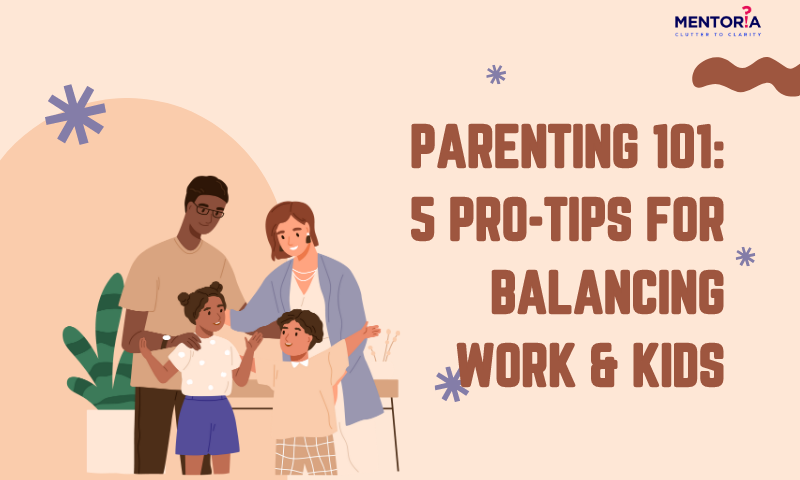Parenting 101: 5 Pro-Tips for Balancing Work & Kids

You’re a working parent, juggling deadlines, conference calls, and the occasional diaper change. It’s like being the star of a high-stakes circus act while simultaneously attempting to keep your sanity intact. You also need to tip-toe across the tightrope of professional obligations and the endless demands of your little humans. It’s like walking a path littered with Legos, coffee spills, and the occasional sock that has mysteriously escaped its designated laundry basket.
You’re in need of a survival guide, and we’ve got you. We know how challenging yet rewarding it can get for being a working parent who’s trying to balance work and parenting, and we’d like to give a big virtual hug for never quitting, and 5 pro-tips to help you balance the juggle of parenting and working.
Being Present; Not Just Physically
Remember that time when your child put on a whole performance, and you were nodding along while mentally making a to-do list? Yeah, let’s try to avoid that. Kids have a sixth sense for detecting absent-mindedness, and they’ll be sure to call you out on it.
As a working parent, it’s easy to get caught up in the whirlwind of professional responsibilities and lose sight of the precious moments with your children. And sometimes, as ridiculous as it sounds, you need to squeeze in that 25-hour work life within the 24-hour window.
Here’s what you can do:
- While juggling multiple roles, it’s crucial to be present when you’re with your children. Dedicate focused, undistracted time to engage with them, even if it’s for a short period. Quality interactions can have a lasting impact on their emotional well-being.
- Put away your phone, close your laptop, and engage in activities that allow you to fully focus on them. This allows you to disconnect from work distractions and fully engage with your children, fostering deeper connections and memories.
- Find activities that allow you to spend time with your children while fulfilling other responsibilities. For example, involve them in meal preparation or household chores, turning mundane tasks into opportunities for bonding.Whether it’s playing a board game, going for a walk, or simply having a heart-to-heart conversation, being present shows your children that they are a priority in your life.
- Embrace spontaneity and say “yes” to your child’s imaginative play. Build epic forts, make time for impromptu trips or movies, and let your inner child join in on the fun. You will not only strengthen your bond but also create cherished memories.
- Establish a consistent bedtime routine that includes reading stories, cuddling, and engaging in calming activities. This dedicated time not only promotes better sleep but also provides an opportunity for intimate conversations and connection.
Celebrating Tiny Triumphs
Giving your child a standing ovation for eating their vegetables might seem excessive, but let’s be real – it’s a small victory worth celebrating. So take the time to recognise their achievements, no matter how small, and express your pride and love. Simple gestures like praising their artwork or applauding their perseverance in completing a challenging task can go a long way in building their self-confidence. Children who feel valued and appreciated by their parents exhibit higher levels of motivation and overall happiness.
Here’s what you can do:
- Create daily or weekly rituals where you and your children express gratitude for each other. Encourage them to share what they appreciate about you, and reciprocate the gesture. This simple act can cultivate a positive atmosphere and strengthen your relationship.
- Surprise your children with small gestures of love and appreciation. It could be a handwritten note in their lunchbox, a special treat, or a fun outing. These unexpected moments create a sense of joy and reinforce the bond between you.
- Whether it’s a big achievement or a small milestone, take the time to celebrate your children’s accomplishments. Recognise their efforts and make them feel valued, boosting their self-esteem and fostering a sense of pride.
- Find opportunities to involve your children in your work life. Invite them to your workplace for a visit, share stories about your workday, or ask for their input on minor work-related decisions. This inclusion helps them understand and appreciate your role as a working parent.
- Establish traditions that revolve around spending quality time together. It could be a weekly family game night, a monthly outing to a favourite park, or a yearly vacation. These traditions create anticipation and provide a sense of stability and togetherness.
Remember, showing appreciation sometimes means celebrating the fact that you managed to put on matching socks amidst the morning chaos or commemorating the rare occasion when dinner doesn’t involve a food fight. Embrace the small victories and give yourself a pat on the back!
Create Signature Fam-Rituals
Rituals and traditions create a sense of stability and connection for both children and parents. Establishing regular routines, such as a special bedtime story or a weekly family movie night, provides a reliable framework that children can rely on. Having that “Pyjama Dance Party” before bedtime might seem unconventional, but who says you can’t boogie down to a kid-friendly playlist while wearing matching pyjamas? It’s a tradition that guarantees laughter and leaves your little ones with dance moves that will surely impress!
Here’s what you can do:
- Create a morning routine that sets a positive tone for the day. It could involve sharing breakfast together, engaging in a quick exercise routine, or starting the day with a silly dance party. These rituals create a sense of structure and shared experiences.
- Make mealtime a special occasion by incorporating traditions. For example, take turns sharing the best and worst parts of everyone’s day or play a game where each family member has to guess a secret ingredient. These traditions foster communication and create lasting memories.
- Set aside regular family meetings to discuss upcoming events, share achievements, and address any concerns. Encourage open dialogue, active listening, and problem-solving as a team. These meetings promote a sense of unity and teach important life skills.
- Dedicate specific periods of the day or week to unplugging from technology and engaging in activities together. Whether it’s a family hike, board games, or a craft project, these tech-free moments allow for genuine connections and quality bonding.
- Embrace and celebrate your family’s cultural or seasonal traditions. Participate in festivals, prepare traditional meals, or engage in customs that hold significance to your heritage. These celebrations help instil a sense of identity and belonging in your children.
Forming rituals and traditions means that your child’s favourite bedtime story will be the one with the most absurd character voices, or that your family dance party might feature moves that are better suited for a comedy sketch. Embrace the joy and laughter that these moments bring!
Learning Your Child’s Love Language
Discovering your child’s love language is like deciphering a secret code. One day, you’re convinced they speak fluent hugs and kisses, and the next, you realise their love language might just be treats and snacks.
Each child has unique ways of feeling loved and appreciated, whether it’s through physical touch, words of affirmation, quality time, acts of service, or receiving gifts. Pay attention to their reactions and cues to discover their primary love language.
Here’s what you can do:
- If your child’s love language is quality time, prioritise one-on-one interactions. Engage in activities they enjoy, have conversations, or simply spend uninterrupted time together, creating cherished memories and deepening your bond.
- For children whose love language is words of affirmation, offer genuine praise and encouragement. Express love and appreciation through verbal or written compliments, acknowledgments of their achievements, and affirmations of their unique qualities.
- Show love to children with acts of service by assisting with tasks or doing something thoughtful for them. Help with homework, surprise them with their favourite snack, or offer assistance when they’re feeling overwhelmed.
- For children who crave physical touch, hugs, cuddles, and gentle gestures are vital. Make physical affection a regular part of your interactions, whether it’s a playful high-five, a comforting embrace, or a tickle session that ends in giggles.
- Some children appreciate receiving gifts as a symbol of love. It doesn’t have to be extravagant; a small token of thoughtfulness can make a big impact. Surprise them with a favourite treat, a handwritten note, or a small trinket that reflects their interests.
Decoding your child’s love language sometimes means realising that their favourite expression of love is when you transform into their personal human jungle gym or when they request bedtime stories featuring their stuffed animal entourage. So enjoy the quirks and find amusement in their unique ways of receiving love.
The Power Of Openly Communicating
Trying to understand your child’s emotions can sometimes feel like trying to crack a complex riddle written in a foreign language. But hey, you’re a linguistic genius, and with a little patience and a lot of laughter, you’ll have those emotions deciphered in no time. It’s no rocket science that clear and open communication is vital for maintaining harmony in your family dynamic, or any place for that matter. The practice of open communication not only strengthens the parent-child relationship but also teaches your children essential communication skills for their future.
Here’s what you can do:
- Foster an environment where your children feel comfortable expressing their thoughts, feelings, and concerns. Create a safe space where open and honest communication is encouraged without judgement or criticism.
- Practise active listening by giving your full attention when your children are speaking. Maintain eye contact, provide verbal and non-verbal cues that you are engaged, and encourage them to express themselves fully.
- As mentioned earlier, establish regular family meetings to facilitate communication. Encourage everyone to share their thoughts, ideas, and emotions. Use these meetings as an opportunity to resolve conflicts, address challenges, and celebrate successes together.
- Teach your children the value of empathy and understanding. Encourage them to consider other perspectives, validate their emotions, and help them develop strong communication skills that promote positive relationships.
- Demonstrate effective communication by being open and honest with your children about your own thoughts, feelings, and challenges. Model constructive ways of expressing yourself, resolving conflicts, and seeking support when needed.
Fostering open communication sometimes means being fluent in understanding your child’s unique blend of words, facial expressions, and elaborate hand gestures. So indulge in the delightful and hilarious moments that arise from miscommunications and keep the laughter flowing.
Get More Pro-Tips From Mentoria
With these five pro-tips in your arsenal, you’re well-equipped to navigate the circus of responsibilities with confidence, laughter, and love. But hey, if you’re hungry for even more insights, support, and a community of fellow balancing experts, Mentoria can help. Whether you’re looking to fine-tune your time management skills as a working parent, discover new ways to engage with your children, or simply share a laugh with fellow working parents who understand the struggles and triumphs, Mentoria has got your back through specially curated workshops to address your need and concerns.
Don’t let the tightrope walk overwhelm you. Embrace the adventure, find humour in the chaos, and remember that you’re not alone. Mentoria is waiting to join you on this wild, wonderful journey of mastering the working parent tightrope walk.









